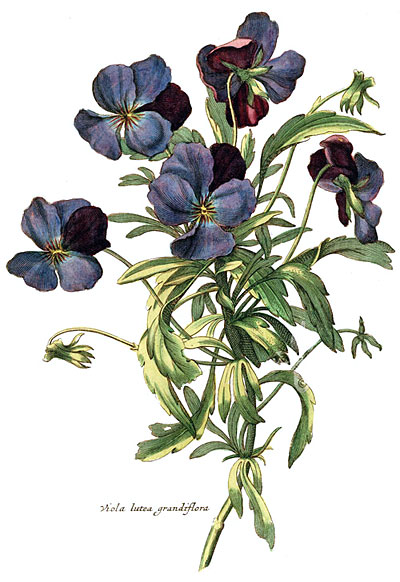

|
|
|
 Hallo again to all. Hallo again to all.
We worshipped today, Rogation Sunday, in a city church surrounded with ground enough for gardens, kept beautifully by volunteers. At the end of the Eucharist we followed the crucifer and the clergy into the garden, where after the always moving litany of the saints (if somewhat hard to hear, because of the competition from passing vehicles), the choir sang a sweet anthem for us (and for the roses and lavender), and the gardens were blessed. The weather was warm, dry, and brilliantly sunny. As the choir's music drifted amongst us, the scent of roses served as a descant. Which was fitting, as the Christian story has been scented from the beginning. The Angel Gabriel, with a sweet Easter lily for a wand, appeared to the Blessed Virgin Mary. Two of the supposed first gifts to the Christ Child were perfume, more or less: frankincense (rich, redolent, resinous) and myrrh (sweet, aromatic, spicy). A later myth has it that Our Lady, during the flight to Egypt, washed linen in a stream and laid it on lavender bushes to dry. And one evening in the candlelighted shadows the contents of an alabaster jar — spikenard — were lavishly spilled by a lady (call her Mary Magdalen) upon Our Lord. Spikenard (Nardosatchys jatamansi) has 'leaves that smell strongly of valerian, but the root, even when fresh, has a pleasant scent of patchouli, slightly sweetened with something resembling musk'. It has been said that denominations favour one sense over another. Children of Calvinism are all ear: hearing the stark Word, pristine and isolated, eschewing all other sensory channels to the heart. The Orthodox, Roman, and Anglican communions, revelling in the Incarnation, magnify the eye: all is lush beauty, sculpture, stained glass, visually rich. Like all generalisations, it is just that. But there is truth in it. At its best the worship of God should take in all senses and make use of eye, ear, touch, taste, and smell. Too often, aside from occasional high-holy-day blasts of incense or a bank of lilies, we forget the first of all our senses. Perhaps there are ways to weave the olfactory once more into our spiritual lives. Not new-age aromatherapy or cheap joss sticks, but something far worthier and more mysterious. But the mysterious can be hard to capture.
Scent is a clue, a promise. A puzzle and a deep pleasure. And perhaps it can confound even the most deeply sceptical of jaded modern folk. Consider: An olfactory scientist is given a sample of gardenia scent, created through the most old-fashioned of methods, enfleurage. Said scientist resigns himself to experiencing one more botched attempt to conjure the gardenia's essence, since most so-called gardenia scents are terrible failures and don't at all capture the mysterious lush fulness of that tropical flower. He writes:
In this little season of Rogationtide, sandwiched between the end of the Great Fifty Days and the Ascension, make it a point to find something in the world around you that's sweet, mysterious, lovely, earthy, bitter, fresh, or intriguing — and sniff. See you next week. |
This web site is independent. It is not official in any way. Our editorial staff is private and unaffiliated. Please contact editor@anglicansonline.org about information on this page. ©2012 Society of Archbishop Justus. Please address all spam to press@anglicansonline.org |